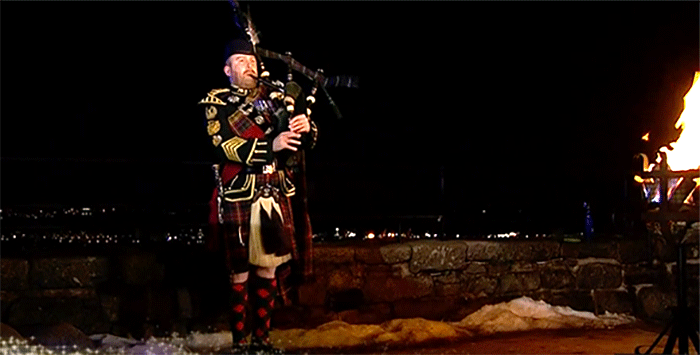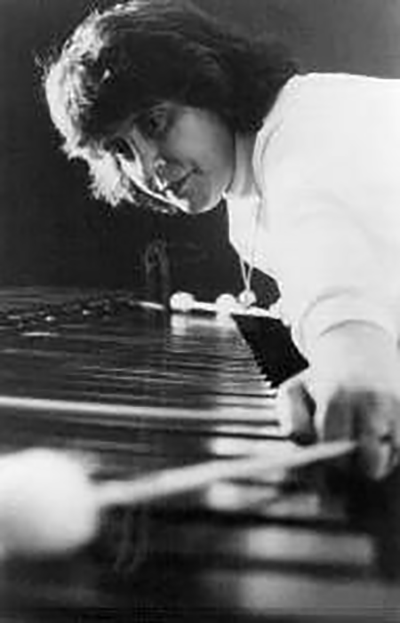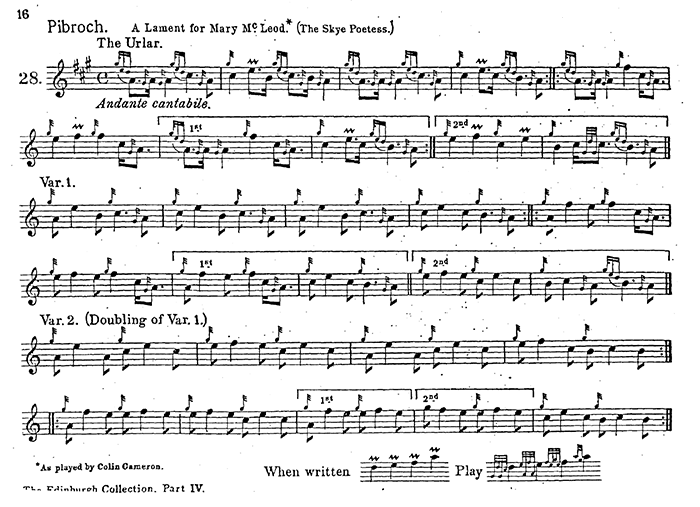
Welcome to the first report of the New Year. I hope everyone had a good time. I think we can all look forward to a better 2021, at least in the latter half of the year. I always avoid the Hogmanay shows on television if I can and managed to do so again this year even with all the isolation strictures.
Trawling through them on New Year’s Day they all looked pretty grim fare. Nothing traditional about them. Bring back Andy Stewart say I! The only bright light was shone by Peter MacGregor (above) up there freezing on the battlements at Edinburgh Castle and that’s real snow at Peter’s feet. Well done Pipe Major! One last point what hellish dreich renderings of Auld Lang Syne. Never heard the like. (You will be pleased to see that I’ve started off 2021 ranting away as usual.)
Despite the 2020 difficulties Piping Press has managed to keep its head above the stormy seas and all thanks to the contributors who have sustained us through some difficult weeks with no contests to cover, no Piping Live, no Worlds, no Oban and Inverness, no Highland games.
We had over half a million+ views last year only 100,000 down on 2019 which is remarkable in the circumstances. Thanks to all the readers who’ve made that possible, and also the piping bodies and individuals who have kept the bratach on high, rode the pandemic waves and made sure there was something for us all to enjoy by way of online competition or tuition.
Those who come to mind and are worthy of praise are, in no particular order, the National Piping Centre, the Scottish Pipers’ Association, Shotts Junior Competition, the Piobaireachd Society, the Competing Pipers, and some RSPBA branches.
Overseas, the EUSPBA, Ontario’s PPBSO, the Balmoral Schools, the Nicol-Brown contest, the BAG in Germany (I’m doing an online piob class for them on Monday), the BC Pipers, SFU Pipe Band and SLOT have all done sterling work. There will be others I’ve missed but you know who you are so well done in absentia.
We all need to keep going with this for at least another few months and if you feel your face to face event might be borderline being spring/early summer then why not have some online contingency in place to cover a cancellation?
Finally thanks to all our advertisers who have kept the support for PP going through commercially difficult times. Again in no particular order: RG Hardie & Co, MacCallum Bagpipes, RT Shepherd & Sons, D Naill & Co., Ayrshire Bagpipes, Murray Reeds, G1 Bagpipes and Reeds and Wallace Bagpipes. There are others who have bought space with us so thanks to them too.
Heather Corbett, former lead percussionist with BBC Scottish Symphony Orchestra, has responded to our recent article on Alex Duthart. Heather writes: ‘I had lessons from Alex Duthart and found the article on him very interesting.
‘I also knew Jimmy Catherwood well. He made good side drum sticks and I still have a couple of pairs of them and some of Alex Duthart’s pipe drum sticks too. I’m still in touch with Jim Kilpatrick who was with Alex in the Shotts band and went on to win the solo championship numerous times.

‘He is now doing masterclasses all over the world and making drums and sticks. The drum I use for the Last Night of the Proms Highland Cathedral is Jim’s drum.’
Following one of my talks for the Piobaireachd Society I received this sound file from Patrick Molard in Brittany. I had made that point that one seldom heard Lament for Mary MacLeod played consistently well. Patrick responded:
‘I enclose a recording of Bob Brown playing this tune on a BBC programme years ago, and for me this is a wonderful rendition of the tune not far from perfection.’ Here it is:
This recording and many others are also available on the extensive Piobaireachd Society tune archive which is free to access for all members.
Whilst on the subject of Mary MacLeod (NOT a tune for beginners) piper Billy Wardrope has forwarded this Colin Cameron setting from David Glen’s book four. It’s close to how the tune should be approached I feel:

Sharp eyed readers will notice the way the cadence Es are attached to the following theme note from which they take their time. Writing the tunes this way allows them to conform to a time signature but it is confusing and has led to many literal interpretations of old scores whereby cadence Es and surrounding gracenotes are played as trills. Sounds ridiculous I know, but there you have it. It’s everywhere at the Donald MacDonald Quaich contest.



















